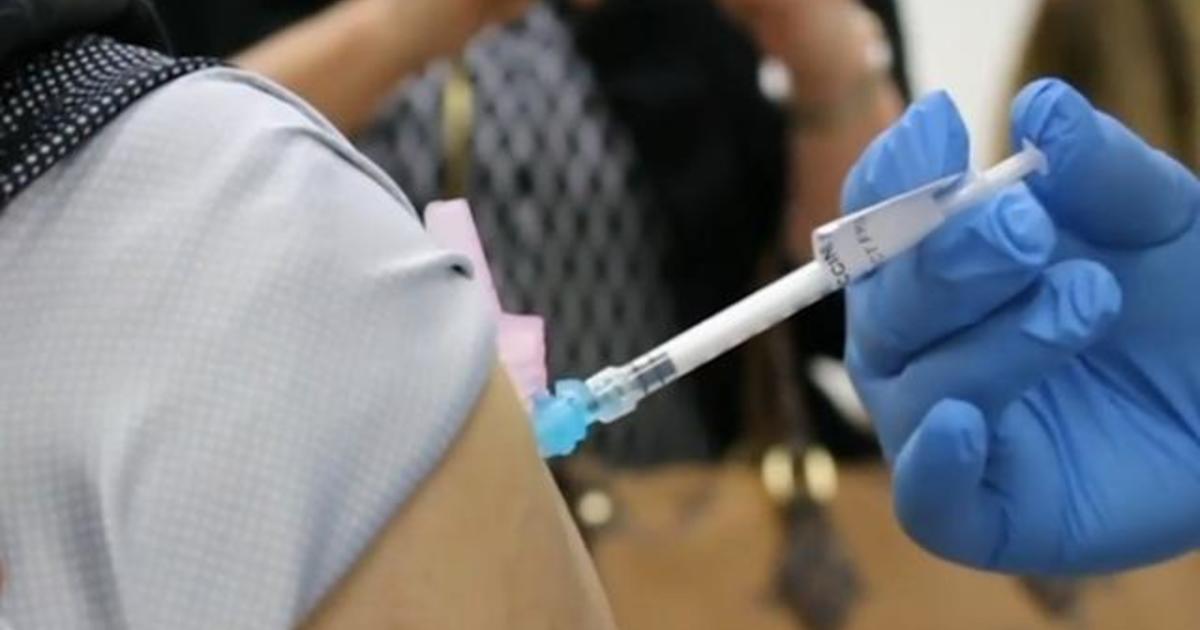
London — A study by researchers at Oxford University in England suggests the risks of experiencing dangerous, rare blood clots in the brain are far higher in those who catch the coronavirus than in those who get either the AstraZeneca vaccine, or the vaccines made by Pfizer and Moderna in the U.S. The research shows that the number of people who experience clots after getting the vaccines made by the American pharmaceutical giants appears very similar to the number who get the rare condition after a shot of the AstraZeneca drug, which was developed in conjunction with Oxford's vaccine institute.
A key finding of the research, revealed Thursday as a "pre-print" study which has yet to be reviewed by other scientists, was that the risk of experiencing a blood clot in the brain was about 95 times higher for people who contract COVID-19 than in the general population.
That's yet another serious health threat associated with the disease, and one the scientists hoped would boost confidence in all of the major vaccines currently available in the Western world, as their research suggests the drugs carry a significantly lower threat of clotting than the disease they've been proven to fend off.
"This is more evidence of the vaccine helping people in a dramatic way from the ravages of COVID-19," CBS News medical consultant Dr. David Agus said of the study on "CBS This Morning."
The analysis of real-world data collated by the global health research network TriNetX and European agencies included information on hundreds of thousands of people who either caught COVID-19, or who were given the AstraZeneca, Pfizer or Moderna shots. Most of the data on the mRNA-type vaccines, which are the American drugs, was from the U.S., while data on the AstraZeneca shots came largely from Europe's mass-vaccination programs.
The data showed that about 4 in every 1 million people who get the American-made vaccines experience cerebral venous thrombosis (CVT), or blood clots in the brain. With the AstraZeneca vaccine, which works in a different way and is similar to the Johnson & Johnson shot, the research showed an incidence rate of about 5 in every 1 million.
That equates to a risk of CVT 10-times greater for people who catch the coronavirus than for those who get the Pfizer or Moderna vaccines, and 8-times greater for those given the AstraZeneca shot.
In a statement issued on Thursday after the Oxford data was released, Pfizer said that its own "comprehensive assessment of ongoing aggregate safety data... provided no evidence to conclude that arterial or venous thromboembolic events, with or without thrombocytopenia, are a risk associated with the use of our COVID-19 vaccine."
Pfizer noted that a CDC review of data had detected slightly more cases of CVT in people given the Johnson & Johnson vaccine in the U.S., but "no similar findings have been observed with the authorized Pfizer-BioNTech vaccine."
"There are concerns about possible associations between vaccines, and CVT, causing governments and regulators to restrict the use of certain vaccines," noted Paul Harrison, Professor of Psychiatry and Head of Oxford's Translational Neurobiology Group, as the U.K. study data was released on Thursday. "We've reached two important conclusions. Firstly, COVID-19 markedly increases the risk of CVT, adding to the list of blood clotting problems this infection causes. Secondly, the COVID-19 risk is higher than seen with the current vaccines, even for those under 30; something that should be taken into account when considering the balances between risks and benefits for vaccination."
The research released by Oxford on Thursday found that about 39 of every 1 million people who contract COVID-19 are likely to experience the clots on the brain. The scientists stressed that the point of their research was not to compare vaccines, but to gather firm data on the risks of all the vaccines compared to the risks associated with catching COVID-19.
"The signals that COVID-19 is linked to CVT, as well as portal vein thrombosis — a clotting disorder of the liver — are clear, and one we should take note of," said Dr. Maxime Taquet, another of the researchers from the Translational Neurobiology Group.
As the figures used to determine the overall incidence rates were being constantly updated, the researchers stressed that "all comparisons must be interpreted cautiously as data are still accruing."
They noted also that it was still unclear whether "COVID-19 and vaccines lead to CVT by the same or different mechanisms," and said that would be the subject of their ongoing research.
World - Latest - Google News
April 15, 2021 at 06:19PM
https://ift.tt/32e1du6
Study shows vaccines carry much lower risk of blood clots than COVID-19 - CBS News
World - Latest - Google News
https://ift.tt/2SeTG7d
Bagikan Berita Ini














0 Response to "Study shows vaccines carry much lower risk of blood clots than COVID-19 - CBS News"
Post a Comment